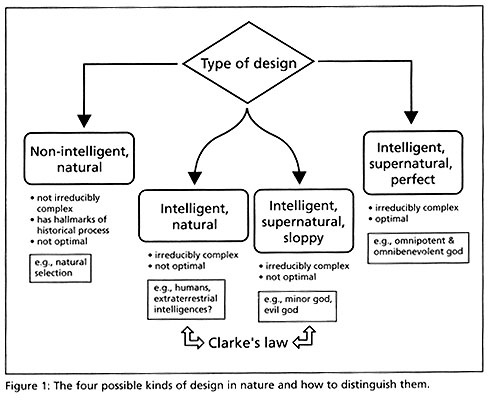 Intelligent Design
Intelligent Design
Designed, Yes — Just Not by God: The Remarkable Implications of Clarke’s Third Law
In public debates (and personal discussions) with Michael Shermer and Massimo Pigliucci, I’ve met an argument, advanced by both skeptics, which opens interesting and largely unexplored territory in the ID vs. naturalism controversy. In a new article, the science writer and astronomer John Gribbin steps into the same territory, a speculative region familiar to fans of science fiction, not to mention philosophy students with time on their hands and imaginations liberated (perhaps) by alcohol. Back in my early teens, when I lived on a steady diet of science fiction and first saw Stanley Kubrick’s masterpiece 2001: A Space Odyssey, I could have discussed these ideas well into the night. A short blog post will have to suffice today.
This figure (below), from Massimo Pigliucci, helps to describe the issue:

Both Pigliucci and Shermer have grasped that causation by a higher intelligence does not necessarily entail causation by a benevolent God — and the former possibility, they think, might follow as a reasonable inference from physical evidence. This was the point, incidentally, of Richard Dawkins’s speculations, at the end of the movie Expelled, about extraterrestrial intelligence possibly causing the origin of life on Earth. These physical effects might appear to us as “magic,” meaning inexplicable by our current science. Arthur C. Clarke’s famous Third Law — “Any sufficiently advanced technology is indistinguishable from magic” — is the wonderfully pithy bumper sticker version of the argument.
In his new article, Gribbin speculates that our entire universe — not just life on Earth — may be an artifact, i.e., caused by intelligence (but not by God! — the Big Guy is still off-limits to science, on this view). If we take Clarke’s Third Law seriously, we find that many of the usual categories of the ID vs. naturalism debate begin to fracture under the strain. In particular, the adjectives “natural” and “supernatural” start to show cracks immediately.
Wild and speculative, obviously. For those who want to sober up (pun intended), Elliott Sober’s essay “Intelligent Design Theory and the Supernatural — The ‘God or Extra-Terrestrials’ Reply” provides another perspective.
One could run an entire graduate philosophy of science seminar, exploring the many implications of Clarke’s Third Law. In fact, I may do that some day soon.
(Issue for the reader to mull: why would causation by a higher, but non-divine, intelligence, be a reasonable scientific inference, whereas causation by God [however defined] would not? What separates the two inferences, logically?)
